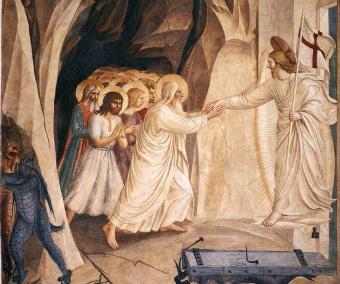The word "purgatory" cannot be found anywhere in the Bible. The term itself, which literally means to purge or cleanse, did not come into existence until around 1175 - 1225 A.D. (dictionary.com).
The belief in purgatory is void of any serious doctrinal support. It is not a teaching inspired by God. It is a teaching that was first clearly expressed by the Roman Catholic Church as early as the Council of Florence (1431 - 1449 A.D.).
Teaching from Man
This teaching is a man-made doctrine that is based on what the New Testament labels the "traditions of men" (Mark 7:8, Colossians 2:8). The promulgation of this doctrine, like many others, ultimately obscures the precious truth of Holy Writ.
Purgatory is based on the Catholic (not Biblical) teaching teach that some who sin and repent in this life may still have to undergo, after death, punishments from God for their transgressions.

Catholics believe that some people retain a "stain" on their souls for sins they have committed even if they repented of them and asked for forgiveness. When they die, according to their teachings, this stain remains on their immortal souls. Those whose stained souls are not considered worthy of eternal torment in hell fire must still have them "cleaned" before entering God's presence.
Dirty Souls
The Catholic Church's doctrinal solution to the problem (which they created) of a "dirty" soul is that it must enter an intermediary state of existence known as purgatory. Once there, a person must spend a short but unknown amount of time enduring sufferings in order to be purged from all sin and made spiritually clean. It is only after this purging, according to the church, that a person is worthy enough to enter heaven.
The Catholics defend their teaching by arguing that prayer for the dead is an ancient practice (actually, it is an ancient false practice promulgated by those considered authorities by the church). Its practice assumes some of those who have died are in a state of suffering that prayer by the living can somehow lessen.
Scripture, however, does not mention or even hint at the existence of a spiritual "cleaning station" called purgatory! It also does not teach that the prayers of the living can somehow benefit those who have died (who are actually unconscious in their graves awaiting a yet future resurrection from the dead).
The teaching that some who ask God for forgiveness are not quite fully forgiven, and therefore must still be punished by Him is purgatory, is a complete mockery of Jesus' sacrifice!
Our Savior's sinless sacrifice as the Lamb of God makes possible the complete and total cleansing of all sins for those who repent (1John 1:7, 9, etc.). In conclusion, the belief in a "middle spiritual state" known as purgatory cannot be supported in the Bible.